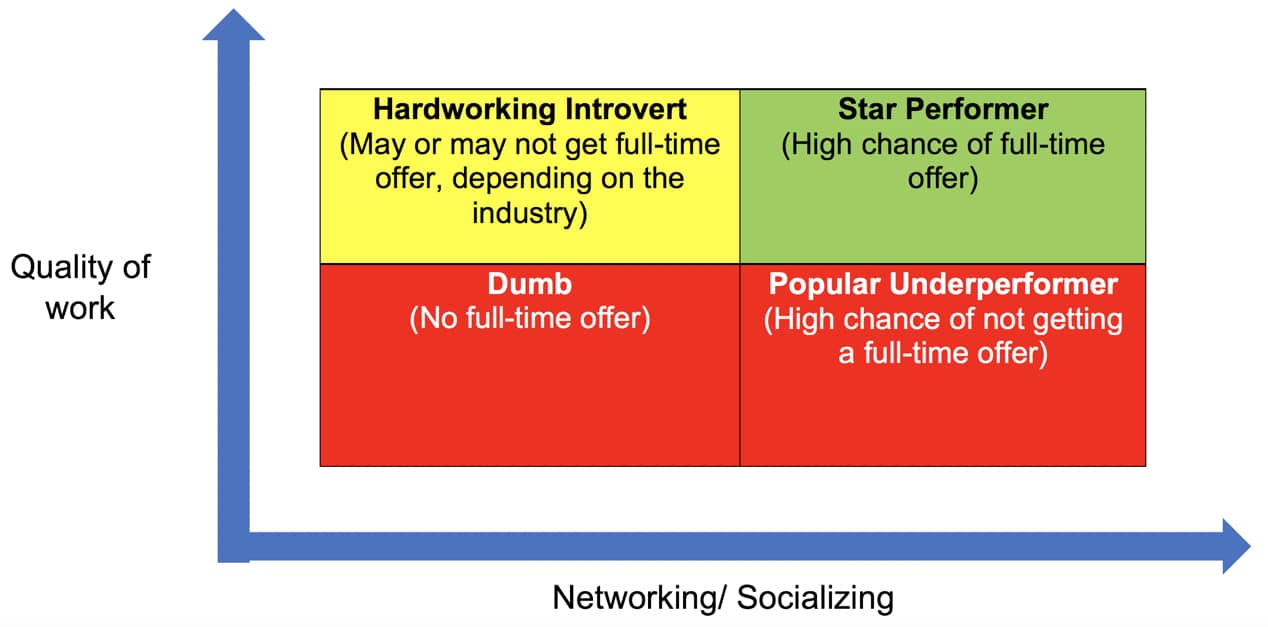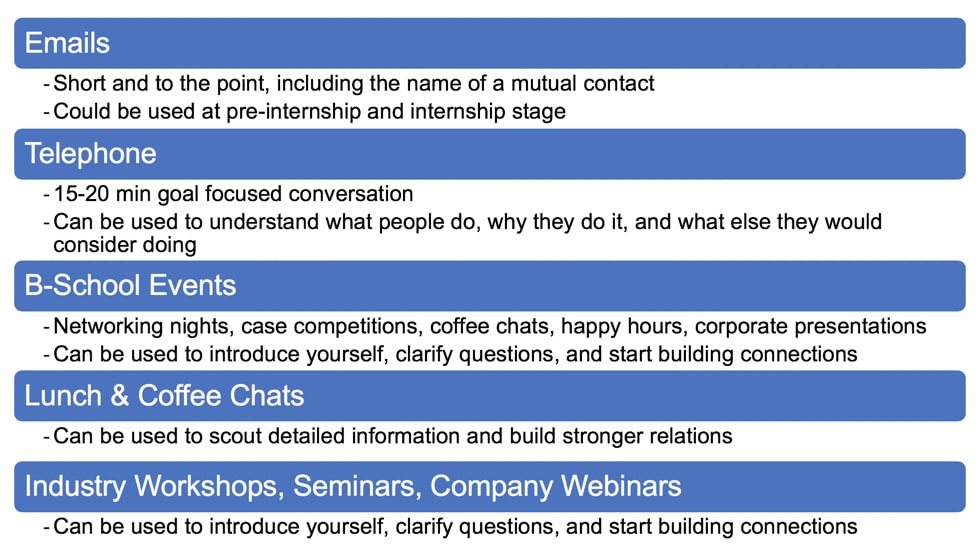In the previous article on ‘The Smart Intern’, we explored the reasons for networking during the internship including to pursue the goals of understanding the full-time hiring process, achieving visibility, and creating advocacy within the organisation for your full-time hire.
In this article, we will take a deep-dive into this goal-based networking process, explore other areas where networking becomes relevant, and at the end look into some networking techniques that have worked for me. So, without further ado, let’s dive down.
1. Goal-driven networking to convert your internship into a full-time job
This section deals with the networking that becomes relevant once you have secured your internship offer. The goal is to secure a full-time offer with the organisation.
Between signing of the internship offer and the start of the internship, your goal should be to collate as much information as possible about your team and the decision-making process in your organisation. A typical MBA internship lasts between 8-12 weeks. The discussion about hiring interns for full-time roles effectively starts a month prior to your last day. Effectively, you have just a month or two (depending upon the duration of your internship) to prove your worth and secure that full-time offer. Are you getting paranoid with that one-month number? I did too! Essentially, we must start with an assumption that fit exists between you and the organisation. We then need to focus on how you can create advocacy to secure a full-time offer.
Let’s investigate how we can use networking to create advocacy.
a. Pre-internship Phase (between acceptance of the internship offer and start of the internship)
I like to believe that the internship starts from the day you accept your offer. To create advocacy in the short amount of time you have, it is important to collate as much information about the decision-making process and the decision-makers before day one of your internship. This information will be relevant for you to strategise your approach and hit the ground running from day one.
*While conversing with prospective team members, it is advisable not to ask about the project you would be working on. They may not know at that point in time. Even if they know, they may not be keen on sharing project details before you have completed all the formalities of joining the organisation.
One of the most effective ways to network during the pre-internship phase is going out for coffee or lunch. That gives you facetime with people and the chance to have some conversations. In case this is not possible, a quick 15-minute phone call is a good alternative.
The information you collate at this stage can help you craft an internship strategy.
b. Internship Phase
The initial two weeks of your internship are crucial. That is the period when you establish your social reputation. Use this time to connect with people across your department and the broader organisation, with a special focus on your team members, decisions-makers, and influencers (remember that you already know the main influencers and decision-makers based on your pre-internship networking). The goal should be for you to create a reputation on the floor so that most people know you by name.
The next step is to use networking to understand what matters to the decision-makers and influencers. In most cases, as an intern, you will be able to help on work-related matters. Use weekly or biweekly coffee-chats to set or revise expectations and get feedback. Use this feedback to quickly pivot your approach and show the best side of you, a person who is fully aligned with the team’s needs.
The best way to network in this phase is lunch, coffee-chats, weekly or biweekly planned individual meetings, team meetings, office parties and events, and general on the floor networking.
If your networking during the pre-internship phase (step a) and internship phase (step b) is executed properly, you should be able to do four things:
The two qualities that matter most during your internship are (1) the quality of the work you produce, and (2) your success at networking. By the end of your internship, your manager and team members will be able to place you in a two-by-two matrix.
2. Other areas where networking is relevant
One of my reasons for attending B-School was to create a strong professional network. In fact, this is a weapon that can give you an edge in your professional and personal life. A person is, after all, defined by his or her values and “network”.
Other areas of the MBA journey where networking can become a powerful tool include:
3. Networking techniques that have worked for me
Conclusion
While networking is an important stepping stone to that fabulous career in management consulting, it is crucial to remember that quality wins over quantity. The goal is to have great conversations that will leave a lasting impression. Networking is undoubtedly a time-consuming exercise, however the connections that you build today will define your net worth as a professional tomorrow.
Happy networking!
Vishal Agarwal is currently undergoing his MBA from Kelley School of Business, Indiana University and is a consulting enthusiast. He interned this summer with EY in their San Jose office. Before Kelley, he was working with EY and he carries 7 years of experience with EY’s International Taxation and Transfer Pricing Consulting practice.
Image: Pexels





